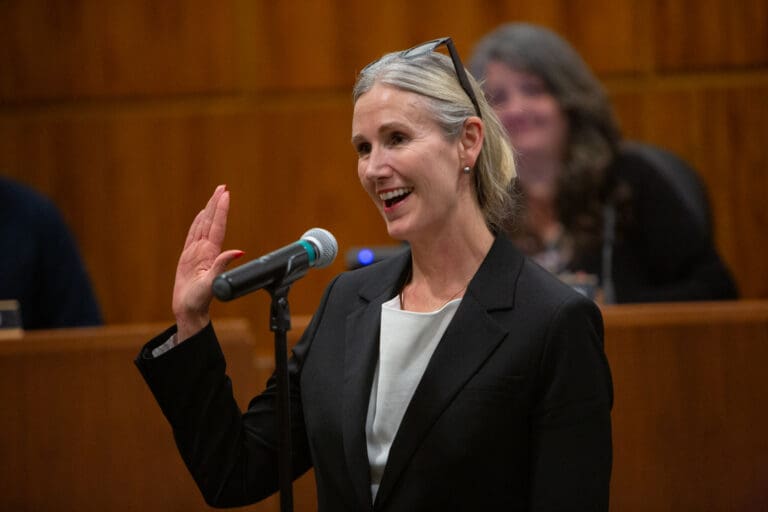Democrats in the state Legislature are trying again this year to put a lid on residential rent increases, in order to protect tenants from being priced out of their homes.
Just as last year, when the rent stabilization bill known as House Bill 1389 died before getting a full House vote, large real estate interests are lining up in opposition to the new legislation, House Bill 2114.
A Bellingham renter spoke in favor of HB 2114 at a hearing Thursday, Jan. 11 before the state House’s Committee on Housing.
“Washington’s housing crisis has severely impacted my family,” said Kerri Burnside, a Silver Beach resident and an organizer with the Bellingham Tenants Union. “My rent has doubled since 2016, and this year my landlord raised my rent an additional $500 a month despite refusing to fix multiple leaks in my roof.”
The bill limits rent increases at most residential properties, including mobile home parks, to 5% per year. A rent increase of 3% or more would require 180-day notice from the landlord.
Further tenant protections include a cap on move-in fees and deposits to no more than one month’s rent, and a $10 limit on late fees.
The 5% cap would not apply to new residences for 10 years after they are built.
If HB 2114 or its companion Senate Bill 5961 passes into law, landlords would still be able to reset rents in between tenants.
Proponents say the bill is meant to improve upon HB 1389, sponsored a year ago by Rep. Alex Ramel of Bellingham. The older bill had a variable cap on rent increases, tied to inflation, and didn’t include the 10-year provision for new developments.
Michele Thomas, director of policy and advocacy for the Washington Low Income Housing Alliance, said the 10-year exemption simply was a concession to developers.
“I don’t believe it’s necessary, policywise,” Thomas said. “It’s necessary politically.”
All sponsors of the two bills are Democrats: 32 in the House and 14 in the Senate.
Property managers and real estate organizations spoke in opposition to the bill at the House committee hearing.
“Many of the short-term benefits of price controls are outweighed by the longer-term damage to the housing market,” said Morgan Shook, a policy advisor for ECOnorthwest, an economic consulting firm.
“The proposal to limit price increases is not rooted in what the main problem is, and that problem continues to be housing shortages,” Shook said.
A Department of Commerce report from March 2023 projected that 1.1 million new homes needed to be built in the state over the next 20 years, “and more than half of them need to be affordable for residents at the lowest income levels,” according to the department.
“We know that communities that add supply see housing prices go down,” Shook said.
Rep. Emily Alvarado of Seattle, prime sponsor of the House version of the bill, said the solution to the state’s housing crisis includes both adding new homes and cost stabilization for renters.
“We are taking steps to increase supply,” Alvarado said Wednesday, Jan. 10 at a news conference for supporters of the legislation. “And we need this bill, to help seniors and families who are struggling with rent increases that are excessive now … They deserve protections against the kinds of excessive and unnecessary rent increases that are pushing them out of their homes.”
The House version of the bill could pass out of the Housing Committee after a session scheduled for 4 p.m. Tuesday, Jan. 16.
Bellingham voters approved an initiative in November that will require landlords to pay tenants the equivalent of three months’ rent as relocation assistance if they raise rents by 8% or more — a provision that could become irrelevant if the statewide rent stabilization bill passes.




